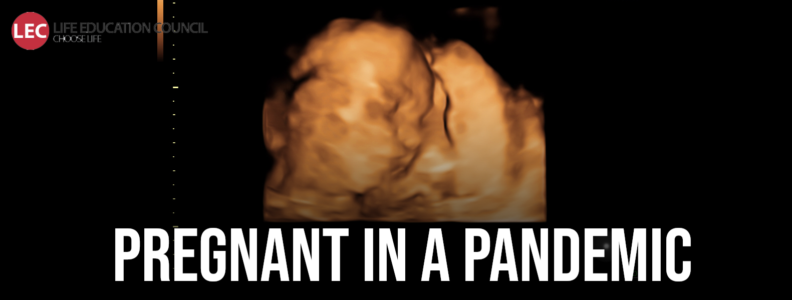by Caroline Douglas, LEC Board of Trustees
Today, I’m 32 weeks pregnant—in the midst of the COVID-19 pandemic.
So what’s it like? It’s not as bad as the click-bait articles make it seem. Sure, there are downsides. I can’t make a midnight run to the store for a jar of pickles. I haven’t interacted with the outside world for two months, because even though pregnant women aren’t considered high risk for COVID-19, I don’t want to take any chances.
But, for the most part? I’m doing okay.
My prenatal appointments are held over the phone. I bought a blood pressure cuff, a blood sugar monitor, and urine reagent strips on Amazon for less than $100 combined. I measure my fundal height (the size of my uterus, which is an indicator of the baby’s growth) with a tape measure, do kick counts, and weigh myself. My mom, a retired doctor, checks my legs for edema (swelling).
These are the main tests that are carried out at each prenatal visit, and I’ve been doing them once a week at home. My pregnancy is low-risk, though; I’m sure it’s more of a trial for mothers who have a high-risk pregnancy or other complications.
But every pregnancy is difficult in its own way, and is coronavirus really making it so much worse? I don’t think so. Yet, some news outlets have reported higher abortion rates during the pandemic. Because fear is causing new mothers to panic.
This wasn’t how I planned it. This isn’t perfect. The timing isn’t right.
Sound familiar? They’re the words so often repeated to rationalize abortion.
In today’s culture, everything is supposed to be perfectly planned before a child is conceived. Enough money in the bank. Graduate degrees earned. A house bought, a college fund set up, and a nursery all set and ready.
But life doesn’t work that way. Randomness is always part of the equation. Couples who have been told they’re infertile, or who are using contraception, become pregnant all the time. And pregnancy is a long nine months—anything can happen between conception and birth! I planned this second baby, unlike my first. But I never could have predicted that five months later we’d be hit with a global pandemic.
Planning for the perfect pregnancy is impossible.
And resistance to this principle is one of the major factors pushing abortion. “I want to terminate my unplanned pregnancy.” “My baby has Downs Syndrome, which wasn’t expected, and I want to have an abortion.” Why do we chase after perfectly-planned pregnancies? And perfect babies?
When there is no such thing as “the perfect pregnancy”?
Why not instead rely on faith? I’m not talking about religious faith, but faith in the little lives growing inside of us. That they are worth the inconveniences, the complications, the risks. And faith in ourselves—that we’re strong enough to get through a difficult pregnancy, or a pregnancy in difficult times.
We can’t let fear—of coronavirus, or a pregnancy that is “unplanned”, or anything else—take our faith away from us.
We can do this.
And so can all the little unborn children, living and thriving in these uncertain times, waiting to come into the world.
